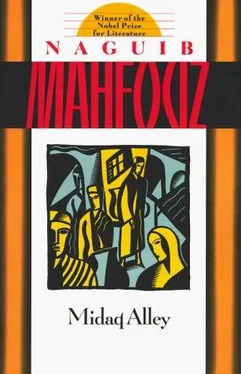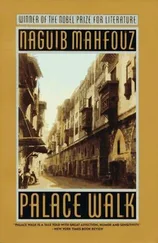Naguib Mahfouz - Midaq Alley
Здесь есть возможность читать онлайн «Naguib Mahfouz - Midaq Alley» весь текст электронной книги совершенно бесплатно (целиком полную версию без сокращений). В некоторых случаях можно слушать аудио, скачать через торрент в формате fb2 и присутствует краткое содержание. Жанр: Современная проза, на английском языке. Описание произведения, (предисловие) а так же отзывы посетителей доступны на портале библиотеки ЛибКат.
- Название:Midaq Alley
- Автор:
- Жанр:
- Год:неизвестен
- ISBN:нет данных
- Рейтинг книги:4 / 5. Голосов: 1
-
Избранное:Добавить в избранное
- Отзывы:
-
Ваша оценка:
- 80
- 1
- 2
- 3
- 4
- 5
Midaq Alley: краткое содержание, описание и аннотация
Предлагаем к чтению аннотацию, описание, краткое содержание или предисловие (зависит от того, что написал сам автор книги «Midaq Alley»). Если вы не нашли необходимую информацию о книге — напишите в комментариях, мы постараемся отыскать её.
Midaq Alley — читать онлайн бесплатно полную книгу (весь текст) целиком
Ниже представлен текст книги, разбитый по страницам. Система сохранения места последней прочитанной страницы, позволяет с удобством читать онлайн бесплатно книгу «Midaq Alley», без необходимости каждый раз заново искать на чём Вы остановились. Поставьте закладку, и сможете в любой момент перейти на страницу, на которой закончили чтение.
Интервал:
Закладка:
Thus he gave consolation to others. So it was that Dr. Booshy once said, "If you are sick, then go to Mr. Hussainy for a cure. If you are despairing, then gaze at the light of his innocence to teach you hope. If you are sorrowing, then listen to him and he will make you happy again." His face was a true picture of his inner self; he was the picture of grace in its most radiant form. As for the poet, he was already somewhat cheered and consoled. He left the couch, the boy following him carrying the fiddle and the book. The old man heartily shook Radwan Hussainy's hand and said goodbye to the other men in the cafe, pretending to ignore its owner, Kirsha. He threw a scornful look at the radio which the workmen had almost finished installing, gave his hand to the lad and drew him outside. They walked out of sight.
Life stirred once again in Sheikh Darwish and he turned his head toward the direction in which they had disappeared, mumbling, "The poet has gone and the radio has come. This is the way of God in His creation. Long ago it was told in _tarikh,__ which in English means 'history' and it is spelled h-i-s-t-o-r-y."
Before he finished spelling out the word, Karnil and Abbas arrived, having just closed their shops. Abbas came first; he had washed his face and combed his fair hair. Uncle Kamil followed, swaying like a palanquin, picking his feet up laboriously and deliberately as he walked. They greeted the company present, sat down and ordered tea. They no sooner arrived before they filled the air with gossip.
Abbas spoke first. "Listen, everyone. My friend Uncle Kamil here has been complaining to me that he is likely to die any minute and, if he does, he won't have enough money to be properly buried."
One of the men present muttered sarcastically, "All's well with Muhammad's people!"
Some of the others commented that Uncle Kamil's profits from his sales of sweets would probably suffice to bury an entire nation. Dr. Booshy laughed and addressed Uncle Kamil. "Are you still harping on dying? By God, you'll probably bury the lot of us with your own hands!"
Uncle Kamil, his voice high-pitched and innocent as a child's, replied, "Be careful what you say and put your trust in God, my friend, I am a poor man…"
Abbas continued: "I was upset by what Uncle Kamil told me. After all, his sweets have done us a lot of good and that can't be denied. So I have bought him a nice shroud as a precaution and put it away in a safe place until the inevitable time comes." He turned to Uncle Kamil and went on: "This is a secret I have been keeping from you deliberately. Now you can see I have made it known to everyone here, so that they can bear witness."
Many of the men in the cafe expressed delight, trying to appear serious so that Uncle Kamil, who was famous for his gullibility, would believe the story. They praised the thoughtfulness and generosity of Abbas and said that what he had done was a worthy deed and one most appropriate toward the man he liked so well and with whom he shared a flat and indeed his life, just as if they were of the same flesh and blood. Even Radwan Hussainy smiled delightedly, and Uncle Kamil gazed at his friend in innocent amazement and asked, "Is it true what you said, Abbas?"
Dr. Booshy replied for him, saying, "Don't doubt it for a minute, Uncle Kamil. I can vouch for what your friend says and I have seen the shroud with my own eyes. It's a very fine one indeed and I would be delighted to have one just like it."
Sheikh Darwish moved for the third time and said, "Good luck to you! Shrouds are the veils of the afterlife. Enjoy your shroud, Uncle Kamil, before it enjoys you! You will be wholesome food for the worms. The reptiles will feed off your tender flesh as though it were a sweet. Why, the worms will grow so fat they will be like _dafaadi.__ The meaning of this word in English is 'frogs' and it is spelled f-r-o-g-s."
Uncle Kamil believed all now and he asked Abbas what type of shroud it was, its color and size. Then he invoked a long blessing on his friend, smiled broadly, and gave praise to God. Just then the voice of a young man entering from the street was heard to say, "Good evening."
He passed by on his way to Radwan Hussainy's house. Hussain Kirsha was the son of the cafe owner. He was in his twenties and had the near-black skin of his father. Hussain was slight of build, however, and his delicate features indicated his youth, fitness, and vitality. Dressed in a blue woolen shirt, khaki trousers, a hat, and heavy boots, he had the satisfied, well-off look of all those who worked with the British Army. This was the usual time for him to return home from the camp. Many men in the cafe stared after him in both admiration and envy. His friend Abbas invited him into the cafe but he thanked him and moved on.
Darkness now completely enveloped the street and the only light came from lanterns in the cafe; they drew a square of light which was reflected on the ground and extended up the walls of the office. The lights which had shone dimly from behind the window shutters of the street's two houses disappeared one after the other. The men in the cafe were all playing dominoes or cards, except for Sheikh Darwish, quite lost in his usual stupor, and Uncle Kamil, who had laid his head on his chest and sunk into a deep sleep. Sanker, the waiter, was as busy as ever, bringing orders and putting money tokens into the till. Kirsha, the cafe owner, followed him with his heavy eyes, enjoying the numbing stream from hashish flowing into his stomach and giving himself over to its delicious power. It was very late now and Radwan Hussainy left the cafe for his house. Dr. Booshy soon left for his flat on the first floor of the alley's second house. The next to leave were Abbas and Uncle Kamil.
The other seats began to empty too, until at midnight only three remained in the cafe; Kirsha, the young waiter Sanker, and Sheikh Darwish. Then another group of men arrived, all peers of the cafe owner, Kirsha, and they went with him up to a wooden hut built on the roof of Radwan Hussainy's house, where they sat around a lighted brazier. There they started a small party which would not end until the dawn gave enough light to distinguish "a black from a white thread."
Sanker the waiter now spoke gently to Sheikh Darwish, telling him that midnight had come. The old man looked up at the sound of his voice, took off his spectacles quietly, and polished them with a corner of his shirt. He then put them on again, straightened his necktie, and rose, placing his feet in his wooden clogs. He left the cafe without uttering a word, shattering the silence with the noise of his clogs striking the stones of the street. All was silent outside, the darkness heavy and the streets and alleys somber and empty. He let his feet lead him where they wished, for he had no home and no purpose. He walked off into the darkness.
In his youth, Sheikh Darwish had been a teacher in one of the religious foundation schools. He had, moreover, been a teacher of the English language. He had been known for his energetic diligence; and fortune, too, had been good to him and he had been the head of a happy family. When the religious foundation schools merged with the Ministry of Education, his position changed, as did that of many of his associates, who, like him, lacked high qualifications. He became a clerk in the Ministry of Religious Endowments and went down from the sixth to the eighth grade, his salary adjusted accordingly. It was only natural that he was hurt by what happened to him and he began a continuous rebellion.
Occasionally he rebelled openly; at other times he felt defeated and concealed his rebellion. He had tried every method, issuing petitions, appealing to his superiors, and complaining about his poverty and the size of his family. All without success. At last he gave way to despair, his nerves almost in shreds. His case became famous in his ministry and he became notorious as a rebel, always complaining, extremely stubborn and obstinate, and very quick-tempered. Scarcely a day went by without his becoming involved in an argument or quarrel.
Читать дальшеИнтервал:
Закладка:
Похожие книги на «Midaq Alley»
Представляем Вашему вниманию похожие книги на «Midaq Alley» списком для выбора. Мы отобрали схожую по названию и смыслу литературу в надежде предоставить читателям больше вариантов отыскать новые, интересные, ещё непрочитанные произведения.
Обсуждение, отзывы о книге «Midaq Alley» и просто собственные мнения читателей. Оставьте ваши комментарии, напишите, что Вы думаете о произведении, его смысле или главных героях. Укажите что конкретно понравилось, а что нет, и почему Вы так считаете.












